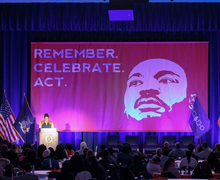Invasion of privacy shouldn’t come hand in hand with fame
Flynn Ledoux | Illustration Editor
TikTok has caused an increase in fan entitlement and lack of boundaries with celebrities, such as Chappell Roan. Our columnist says that fans should not be negotiating and debating their privacy.
Get the latest Syracuse news delivered right to your inbox.
Subscribe to our newsletter here.
Not many people know of Missouri-born Kayleigh Rose Amstutz. But millions of people know her stage name, Chappell Roan. As recent events have indicated, Roan’s newfound fame comes with the pressure of the public eye. Backlash regarding Roan’s response to uncomfortable fan behavior points toward a larger issue of why celebrities need to sacrifice their right to privacy.
The “Midwest Princess” released her first song “Die Young” in 2018, the success of which led to her signing a deal with Atlantic Records. However, after the release of her single “Pink Pony Club” in 2020, she was dropped from the label due to low success.
Thankfully for pop fans everywhere, Roan continued to make music and released her debut album “The Rise and Fall of a Midwest Princess” in 2023, which skyrocketed in popularity after going viral with touring artist Olivia Rodrigo.
From the moment that Roan performed as the opener for part of Rodrigo’s Guts tour, her songs blew up across streaming platforms, and most importantly, TikTok.
In conjunction with her growing pop stardom, Roan released “Red Wine Supernova,” an explicitly queer song about Roan’s lust and relationship with another woman. This song quickly became one of TikTok fans’ favorite queer anthems, not only due to the upbeat tune and the straightforward queer themes in the lyrics, but also because of Roan’s unique persona.
While TikTok is one of the main reasons for Roan’s fame, it seems like it may be her downfall as well after a recent post by the star on the platform.
After a few concerning and inappropriate interactions with fans, Roan posted a video stating that she needs her fans to respect her privacy. She said she doesn’t “care that abuse and harassment” are a “normal thing” for people who are in the public spotlight.
Roan also reasoned that she is a “random b*tch” and the fans are also a “random b*tch” — hence, it’s weird for fans to act like they’re entitled to her personal life and attention just because she’s a celebrity.
Although Roan disabled comments on the video, it has still received negative attention from critics and fans alike. This backlash was due to claims from fans that Roan had no right to demand privacy because it was these very fans that brought her such success.
In response to Roan’s post, one person even posted on X that Roan is “not even that famous”. This post is just one of many that uses Roan’s niche fame as a way to say that she does not deserve her own privacy and owes it to her fans to interact with them.
While I do agree that no celebrity can gain popularity without fan support, I think that Roan is absolutely justified in her statements.
As Roan argues, normal people wouldn’t stalk a random person, so why is it different for a celebrity? The level of entitlement that fans think they have to a celebrity’s personal life is absolutely absurd, as is the way the platform TikTok plays in enabling fans to act this way.
With the ease people, including celebrities, can post personal information and their daily lives on the platform, some fans have formed deep connections or even parasocial relationships with their idols on the app. In addition, TikTok is the perfect medium for critical opinions and trolls to spread negativity, and with that, manipulation of what Roan was really saying.
While I affirm that everyone is entitled to their own opinions, it is worth noting how quickly one harmful or incorrect statement can spread on TikTok.
Roan’s statement on boundaries is not a new concept in the celebrity sphere. Eight years ago in 2016 Justin Bieber publicly advocated his “no photo policy” after becoming fed up with entitled and creepy fan behavior.
Another celebrity who spoke out after Roan was Madison Beer, who recently posted on Instagram explaining that she will not take pictures with fans in or around her hotel while on tour due to safety reasons.
This boundary, very similar to Roan’s, interestingly received little to no backlash from fans. Rather, many praised Beer for speaking out, which then led some to bring up Roan’s comments for opening up about these behaviors from fans. While it’s unclear why Roan was the victim of such criticism and Beer was not, I feel it’s important to note the difference in treatment between queer artists and heteronormative, conventional performers such as Beer when it pertains to topics of the same nature.
Despite what some users on TikTok may say, Roan has every right to request fans respect her boundaries. Privacy is something we all value and deserve as individuals, regardless of our job and social fame.
Everybody deserves basic respect and is allowed to set boundaries — their social status does not change that fact. These boundaries are also not things that can be negotiated or debated by fans online. Instead, they should be praised and followed.
Just because Roan and other stars have chosen the path of public fame does not give anyone the right to invade their privacy and have entitlement to their personal lives. As Roan said, it’s not right to stalk a random woman on the street, and fame alone does not change that basic fact.
Claire McBride is a sophomore Television, Radio and Film major. Her column appears bi-weekly. She can be reached at Cpmcbrid@syr.edu.

Published on September 4, 2024 at 11:05 pm





